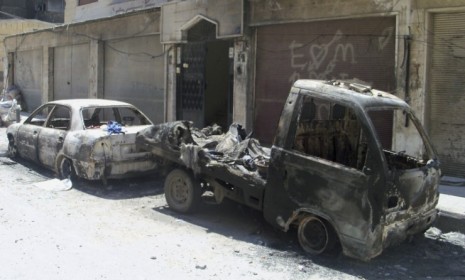Time for the West to intervene in Syria?
With Bashar al-Assad's forces continuing to kill civilians despite the peace plan, France says it might be time to reconsider military strikes

A free daily email with the biggest news stories of the day – and the best features from TheWeek.com
You are now subscribed
Your newsletter sign-up was successful
With Syrian forces continuing to shell civilian areas, and a U.N.-brokered peace plan on the verge of collapse, France is pressuring the United Nations to reconsider military intervention. Secretary of State Hillary Clinton also wants to impose harsher measures if Syria and armed rebels continue to fight, although the U.S. and NATO say they don't plan to send troops. Is there any chance foreign soldiers will step in to stop the violence?
Like it or not, intervention is on the table: The world needs to stop the killing in Syria, says Kurt Volk in The Christian Science Monitor. Otherwise, we'll repeat the tragedy of Bosnia, sitting on our hands, despite the shelling of civilians, until a mass atrocity occurs that is so horrific we'll have to do something. Then the only question will be why America and its friends didn't act sooner.
"The case for military intervention in Syria"
The Week
Escape your echo chamber. Get the facts behind the news, plus analysis from multiple perspectives.

Sign up for The Week's Free Newsletters
From our morning news briefing to a weekly Good News Newsletter, get the best of The Week delivered directly to your inbox.
From our morning news briefing to a weekly Good News Newsletter, get the best of The Week delivered directly to your inbox.
It is too early to give up on diplomacy: Don't ignore the positive developments since both sides agreed to the ceasefire, says Marc Lynch at Foreign Policy, including a "leap in peaceful protests." U.N. envoy Kofi Annan's peace plan represents the most plausible, "if still far from certain, path towards demilitarization." The military options, from arming the Free Syrian Army to mounting a foreign invasion, don't offer a quick and easy path to peace — look at Iraq — and might "make the situation considerably worse."
"Give Annan's Syria plan a chance"
Sending troops would take a consensus that doesn't exist: "The case against Syrian President Bashar al-Assad is getting stronger by the day," says the United Arab Emirates' Khaleej Times. The ink on the peace agreement is barely dry, but Assad's "duplicity and actual disregard" for the ceasefire is already apparent. But deploying observers is as far as the U.N. can go, because Russia and China can veto any resolution authorizing military intervention, and both are still "pressing for the U.N. peace plan to be given a chance."
A free daily email with the biggest news stories of the day – and the best features from TheWeek.com
-
 Political cartoons for February 16
Political cartoons for February 16Cartoons Monday’s political cartoons include President's Day, a valentine from the Epstein files, and more
-
 Regent Hong Kong: a tranquil haven with a prime waterfront spot
Regent Hong Kong: a tranquil haven with a prime waterfront spotThe Week Recommends The trendy hotel recently underwent an extensive two-year revamp
-
 The problem with diagnosing profound autism
The problem with diagnosing profound autismThe Explainer Experts are reconsidering the idea of autism as a spectrum, which could impact diagnoses and policy making for the condition